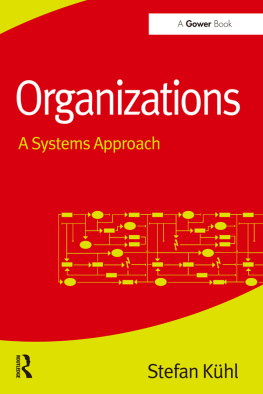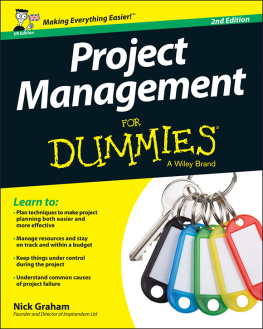Stefan Khl is professor of sociology at the University of Bielefeld in Germany and works as a consultant for Metaplan, a consulting firm based in Princeton, Hamburg, Shanghai, Singapore, Versailles and Zurich. He studied sociology and history at the University of Bielefeld (Germany), Johns Hopkins University in Baltimore (USA), Universit Paris-X-Nanterre (France) and the University of Oxford (UK).
Other Books by Stefan Khl
Organizations: A Systems Approach
(Routledge 2013)
Ordinary Organizations: Why Normal Men Carried Out the Holocaust
(Polity Press 2016)
When the Monkeys Run the Zoo: The Pitfalls of Flat Hierarchies
(Organizational Dialogue Press 2017)
Sisyphus in Management: The Futile Search for the Optimal Organizational Structure
(forthcoming)
The Rainmaker Effect: Contradictions of the Learning Organization
(forthcoming)
To contact us:
Metaplan
101 Wall Street
Princeton, NJ 08540
USA
Phone: +1 609-688-9171
stefankuehl@metaplan.com
www.metaplan.com
Imprint
ISBN (Print) 978-0-9991479-8-6
ISBN (EPUB) 978-0-9991479- 9-3
Copyright 2018 by Stefan Khl
All rights reserved. No part of this publication may be reproduced or transmitted in any form or by any means, without permission in writing from the author.
Translated by: Lee Holt
Cover Design: Guido Kltsch
Typesetting: Thomas Auer
Project Management: Tabea Koepp
www.organizationaldialoguepress.com
PrefaceManaging Projects
beyond the Model of the
Organization as Machine
Given the innumerable books on project management, it is worth asking what the benefit of yet another book on the topic might be. There are already several project management books for every niche industry. Various associations and institutes for project management also publish their own manuals. Even the successful For Dummies series offers volumes on Mindfulness for Dummies and Finding a Dream Man for Dummies , as well as Project Management for Dummies , which does not offer anything other than what is in most other project management books (Portny 2010).
The reason for writing another book on project management is simple: namely that there is a striking blind spot in the discussion about project management. The overwhelming number of books, most of the journal articles specializing in project management, and the majority of training courses for project managers are shaped by the notion that you can precisely define a projects goal, determine in advance the resources necessary to attain this goal, and specify in advance a highly detailed project structure for reaching the target, including the assignment of responsibilities.
This approach has a certain off-the-cuff plausibility. It pairs well with the idea that organizations are defined by their purpose, and that the best suitable resources for attaining this purpose must be found. The problem with this perspective, howeverand this has been convincingly demonstrated in organizational researchis that most organizations do not function according to this simple ends-means scheme. Organizations are characterized by contradictory aims that change in frequently unnoticed ways and that cannot be broken down easily into sub-goals for individual organizational units.
This project management book seeks to contribute to a paradigm shift in the management of organizations. The idea that organizations can be managed and optimized like machines may dominate the fantasies of managers and consultants, but the popularity of this notion has suffered significantly in recent decades. It is clear, both from the results of organizational research and from everyday practice, that organizations do not function like simple machines that predictably turn a specific input into a specific output. But even if managers and consultants pay lip service to this reality by describing organizations as complex, non-trivial or chaotic, the instrumental-rational perspective on organizations still remains dominant in the literature.
This book will show what management and leadership beyond the ends-means scheme can look like. To do this, we begin in Chapter 1 with a definition of projects as a special form of goal programs, and we classify projects within the context of an over-arching organizational perspective, while developing the reasons for the attractiveness of an ends-means scheme in project management. In Chapter 2, we examine the limitations of this approach and then provide an extensive description of an alternative approach to project management. In Chapter 3, we make the case for freeing ourselves from ideas about clearly differentiated project phases, uniquely defined project goals, the establishment of project and steering groups, and the evaluation of projects. In the conclusion in Chapter 4, we assess the opportunities and limits of this alternative approach to project management.
The presentation of our approach relies on several years of experience in working on project management approaches with companies, ministries, administrations, universities, hospitals, and non-profit organizations. Even if this book has emerged out of practical work on project management and is primarily oriented towards practitioners in organizations, I still believe that our approach resonates with insights from scholarly organizational theory. We want to avoid the flaw found in a majority of project management literature for practitioners, namely the lack of reference to specific approaches, such as behavioral decision-making theory, systems theory, or micropolitics.
We cant simplify it too much, though. In management studies we often hear complaints that scholarly texts are difficult for practitioners to put to use, and that texts that are particularly relevant for practitioners typically do not meet the standards of scholarship (Augier/March 2007; Bartunek/Rynes 2014). This text will not be able to fully bridge this gap either. I do hope however that we can situate our proven approach, which I present in detail in Chapter 3, into an over-arching theoretical framework. This audience therefore targets practitioners who arent scared off by the occasional demonstration of how basic ideas in organizational theory can inform practical recommendations for project management. If scholars find one or another of the books ideas interestingsuch as the classification of projects as a special form of goal program, informed by systems theorythen all the better; but this isnt our primary objective.
This book is part of a small series in which we present the essentials for the management of organizations against the backdrop of modern organizational theories. The Management Compact series includes books on the subjects of Developing Strategies , Designing Organizations , Influencing Organizational Culture , Developing Mission Statements , and Exploring Markets . In our book Lateral Leadership , we assess how power, understanding and trust influence the management of organizations. Because we crafted the idea for these books at the same time, attentive readers will notice related trains of thought and similar formulations in all of the volumes in this series. These overlaps were created intentionally to emphasize the unity of the ideas behind the series and to highlight the connections between the volumes.











